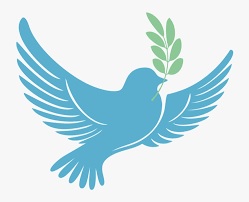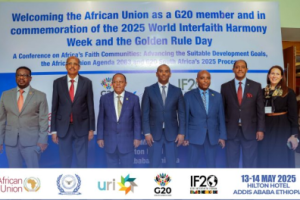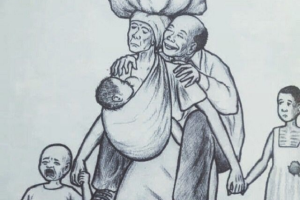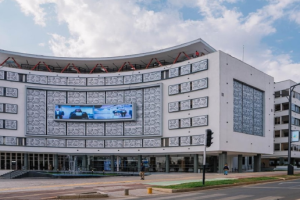
Religious institutions play a pivotal role in sustaining peace, stability, and development by promoting moral values, fostering social cohesion, and advocating for tolerance.
By preaching their core values which encompass compassion, forgiveness, love empathy and integrity and they can reinforce social unity and stability, support communities to resolve conflicts peacefully and maintain harmony thereby create a sense of togetherness and belongingness between and among peoples with diverse culture. Serving as an agent of social control of behavior, they can contribute significantly to the peaceful coexistence of diverse societies.
Ethiopia, with a rich mix of ethnicities and religious traditions religious leaders help promote harmony, understanding, and mutual respect among different communities. By encouraging dialogue, tolerance, and collaboration, they serve as key figures in mediating conflicts and fostering unity. Through their teachings and actions, religious leaders in Ethiopia play a significant role in sustaining peaceful coexistence and building a peaceful society where people of various faiths live together in harmony.
In essence of this, the Ministry of Peace recently held discussions with religious leaders of different faiths focusing on national peace building activities.
During the discussions held with the Ethiopian Orthodox Tewahedo Church, the two parties agreed to collaborate on ways to strengthening the ongoing peace building efforts in the country and promoting peace.
The Ethiopian Orthodox Tewahedo Church Patriarch, Abune Mathias confirmed that the church will work more diligently and closely with the government than ever before on peace building activities.
The Patriarch also expressed his appreciation and respect for Minister of Peace, Mohammed Idris for coming to the Patriarchate for acquaintance and discussion.
The Minister, in his part, appealed to the church for national peace prayers to strengthen prevailing peace building efforts and tackle existing challenges, drawing upon the church’s extensive and well-established experience in peace and state building.
He further confirmed that, the government will take whatever price for peace building efforts, pledging his Ministry’s dedication to work in cooperation and support with all religious leaders and institutions.
Meanwhile, the Ministry of Peace held discussion with leaders of the Ethiopian Islamic Affairs Supreme Council ((EIASC)) centering on this same issue – on national peace building and development initiatives in the country.
During the discussion, the Ethiopian Islamic Affairs Supreme Council President, Sheikh Haji Ibrahim Tufa said that the Council has been carrying out various activities to strengthen Muslim unity and peace in the country.
Mentioning that two years has already elapsed since the Majlis’s reform in the Supreme Council has begun; the President said that, during this period, the Ethiopian Islamic Affairs Supreme Council has been carrying out various activities to strengthen Muslim unity and peace in the country.
Sheikh Haji Ibrahim also reiterated Council’s cooperation with the government on the peace building and development initiative that will continue to be strengthened in the future.
The President also requested the government, especially the Ministry of Peace, to provide the necessary support in the upcoming Majlis elections.
Minister of Peace, Mohammed Idris on his part appreciated the Council’s efforts in addressing the long-standing dispute between clans in the border areas of Afar and Somali regional states. The Minister also called for the continuation of the Council’s engagement in comprehensive peace and development activities.
Acknowledging the invaluable role of religious institutions in building lasting peace, the Minister called on the Supreme Council to hold nationwide prayers for the country’s peace.
Citizens should not suffer due to the lack of peace as long as Ethiopia is a religious country and has many cultures and experiences of resolving conflicts.
The Minister called on the Supreme Council to issue a national call for peace and a prayer for peace during Friday prayers so that the current peace can be strengthened, the emerging peace challenges can be resolved and a lasting solution can be found.
Mohammed also reiterated his government’s unwavering stance to ensure durable peace.
Stating that the government has always been committed and repeatedly called for peace, the Minister said it will further strive to resolving conflicts through dialogue. The Ministry of Peace will work in cooperation with all religious leaders and institutions and renewed the government’s determination to provide the necessary assistance to ensure that the upcoming Majlis elections are held peacefully, ENA reported.
In related development, at the discussion forum organized by the Ministry of Peace in partnership with the Ethiopian Evangelical Church Fellowship yesterday under the theme The Role of Religious Leaders in Sustaining Lasting Peace and National Development.” a call was made for the contribution of religious leaders to the country’s development process.
Speaking at the event, Peace State Minister, Keyredin Tezera (PhD) emphasized that national development requires inclusive participation and collaborative efforts from all. He noted that Ethiopia, with its diverse identity, should not focus on issues that separate us but rather on fostering unity, and building a strong and resilient government.
“Our national challenges should be addressed through dialogue, peaceful talk and negotiation to ensure lasting peace and development. In this regard, the aim of the forum is to create a platform for religious leaders to contribute their share and perspectives on the nation’s development process.” he remarked.
The Ethiopian Evangelical Church Fellowship President, Pastor Tsadiku Abdo, on his part highlighted the importance of genuine cooperation and justice in the national development. He explained that development work is a continuous process that requires regular monitoring and accountability.
Pastor Tsadiku also remarked that much of Ethiopia’s challenges are due to the lack of understanding of the role of religious leaders in national development and peace-building. He emphasized that religious leaders play a critical role in the development process and should contribute practically to these efforts.
During the event, a book titled “Peace Building Training Manual” was inaugurated and the Ministry of Peace, the Ethiopian Evangelical Church Fellowship signed a Memorandum of Understanding (MoU) that enables the two to work together on national and peace-building efforts.
BY STAFF REPORTER
THE ETHIOPIAN HERALD TUESDAY 31 DECEMBER 2024





